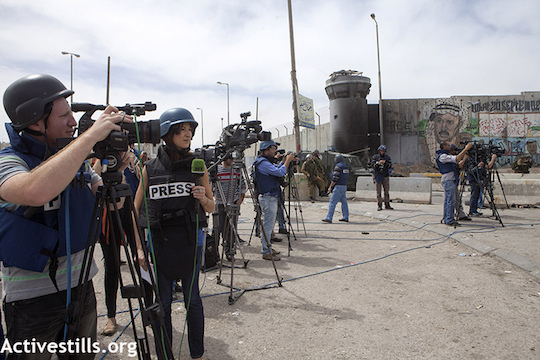The Israeli government office responsible for accrediting journalists takes issue with a foreign correspondent sharing +972 Magazine articles on social media, publishing critical stories, refuses to renew his visa.

Israel’s Government Press Office has refused to renew the media accreditation for Derk Walters, a Dutch journalist who has been reporting from Israel-Palestine since 2014. Walters is the correspondent for NRC Handelsblad, a leading Dutch newspaper. Without accreditation he cannot renew his work visa, which means he must leave the country by July. The GPO has been critical of Walters’ reporting, but not because it was inaccurate; instead, they seemed disturbed by the incidents he chose to report and how he framed his reporting.
In one example, Walters described the situation in Hebron as one where 600 Israeli settlers keep 175,000 Palestinians hostage. Ron Paz, the head of the GPO’s communications program wrote in an email to Walters that this characterization was anti-Semitic. Paz contacted Walters on several other occasions, each time to criticize the tone rather than the accuracy of his reporting, or to berate him for tweeting links to articles the GPO did not like. It is worth pointing out that Israeli media outlets have published reports that are far more critical of the situation in Hebron, than the one by Walters that attracted Paz’s attention.
As reported by both Haaretz and NRC, the GPO accidentally attached a revealing internal email in its correspondence with Walters. In it, Paz writes to GPO director Nitzan Chen that he will make Walters “sweat” by threatening him with repercussions for having moved from Tel Aviv, which he specified as his residence on his visa application, to East Jerusalem — which is probably the most popular choice of residence for foreign correspondents covering Israel-Palestine, because of its convenient location between the West Bank and Israel.
This is certainly not the first time the GPO has targeted or bullied a reporter. The question is: why Walters? He is not unusually critical of Israel in his reporting, and he has not been accused of breaking laws or reporting inaccurately. The answer seems to lie in his tweets. He retweeted a link to an article that was published in +972 Magazine, which refers to BDS and which uses the term “Palestinian citizens of Israel” rather than “Israeli Arabs.” Walters did not append any commentary to the retweet.
As per Haaretz, Paz contacted Walters about the tweet:
Paz also wrote that retweeting an article from the left-wing website +972 Magazine raised “several questions, if I may point them out in the frame of our open and frank dialogue.” Paz wrote to Walters that “we do not think it is legitimate for journalists to take a stance in this highly controversial issue.” He wrote that such a tweet “gives the feeling of supporting the ideas in the articles.”
Paz also asked, “If you merely quoted an opinion (although highly controversial) which is not your own, would you consider quoting/tweeting an intelligent well-put article which explains why singling out Israel for political boycott is the new form of anti-Semitism?” He added: “’Palestinian Israelis’ is a problematic phrase in many people’s opinion.”
So this is really about Israel’s growing intolerance of BDS, and about the Prime Minister’s Office (under whose authority the GPO falls) wanting to control the discourse. The GPO’s tactics are another iteration of the 21st century “soft,” quasi-democratic, authoritarian state policy. Erdogan deports journalists out of Turkey for writing about Kurds. Trump refuses to answer questions posed by journalists he dislikes. And Netanyahu denies accreditation to journalists who mention BDS or write about Israel’s Arab Palestinian minority using terms that conflict with the government’s political agenda — i.e., no recognition of Palestinian identity.
Imagine the chilling effect this will have on the press, if foreign correspondents are afraid they will be deported merely for retweeting an article that conflicts with the Netanyahu government’s worldview. What if that journalist is a foreign resident with an Israeli spouse and Israeli children, for example? If the choice is between losing one’s livelihood and having to be separated from or uproot one’s family, the choice will obviously be to self censor.
As NRC Editor-in-Chief Peter Vandermeersch wrote, “There is no other way but to see the decision as an attempt by Israel to obstruct free and critical news gathering about the country.”

